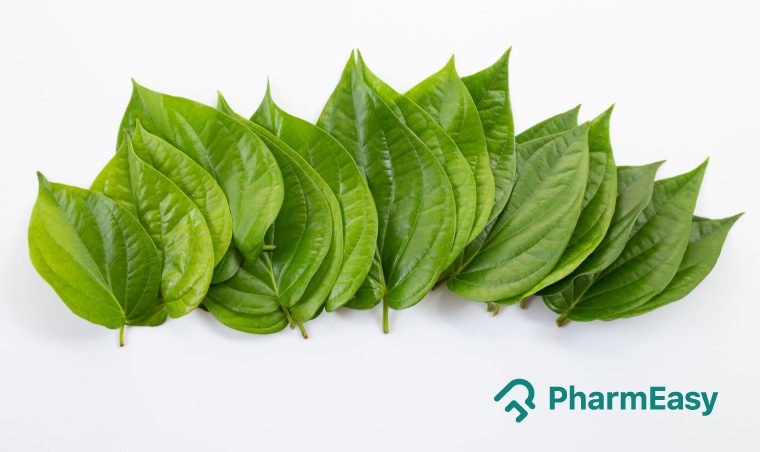Betel Leaves: Uses, Benefits, Side Effects By Dr. Smita Barode
Introduction:
Betel leaves are regularly used as paan (Betel leaf + slaked lime + areca nut) which acts as a mouth freshener or is also consumed with tobacco. We eat betel leaves casually, without realizing how it could benefit our bodies. Betel leaf belongs to the genus piper and its scientific name is Piper betel. Betel leaf is a heart-shaped perennial creeper and is found in tropical, and sub-tropical countries like India, Sri Lanka, Malaysia, Indonesia, the Philippines, and East Africa. Betel leaves are used for religious purposes and for chewing. Betel vine varieties are divided into five main groups based on the morphological characteristics and presence of essential oils.1 Betel leaves may be beneficial to human beings and let us look at some astounding betel leaves benefits.
Nutritional Value of Betel Leaves:
The value of betel leaf nutrition is given in the table below:

| Nutritional Component | Composition |
| Water | 85-90% |
| Protein | 3-3.5% |
| Fat | 0.4-1% |
| Minerals | 2.3-3.3% |
| Fiber | 2.3% |
| Carbohydrate | 0.5-6.1% |
| Potassium | 1.1-4.6% |
| Calcium | 0.2-0.5% |
| Vitamin C | 0.005-0.01% |
| Essential Oil | 0.08-0.2% |
Table 1: Betel Leaf Nutritional Value2
Properties of Betel Leaves:
Betel Leaves may possess the following properties:
- It may protect against cancer
- It may be an antioxidant
- It may prevent the growth of fungi
- It may protect against allergic reactions
- It may heal wounds
- It may be used in case of constipation1
Also Read: Maple Syrup: Uses, Benefits, Side Effects By Dr. Smita Barode
Potential Uses of Betel Leaves for Overall Health:
Betel leaves may have numerous health benefits and some of the potential health benefits are as follows:
1. Potential use of betel leaves for headache
Betel leaves may have cooling and analgesic (relieve pain) properties. It may be used to relieve pain from severe headaches.1 Further studies on animals and humans are required to check the effect of betel leaves on headaches. If you experience a prolonged headache or unbearable pain, you must consult your doctor.
2. Potential use of betel leaves for cancer
Betel leaves may have anti-cancer properties and may protect the body against cancer. Studies showed that phenolic-related compounds in betel leaf extract may possess the capacity to inhibit the growth of cancerous cells.1 However, further studies are required to check the use of betel leaves on cancer. Cancer is a dangerous disease; therefore, you must get proper treatment instead of self-medicating.
3. Potential use of betel leaves for fungal infection
Betel leaves may be used for fungal infections, contain a bioactive compound hyroxychavicol (polyphenol) and it may inhibit the growth of fungus. Betel leaves are used as an antifungal agent for topical infections or as gargle mouthwash for oral fungal infections.1 However, further evaluation of the antifungal activity of betel leaves is required in humans. If you suspect a fungal infection, you must consult your doctor and get proper treatment before the infection becomes severe.
4. Potential use of betel leaves for gastric ulcers
Betel leaves may be used in gastric ulcers due to their gastroprotective properties. Due to their antioxidant characteristics, betel leaves may increase enzymatic activity which may be advantageous for gastric ulcers. Betel leaves may increase the mucus content on the stomach lining and inhibit the volume of gastric acid, thereby acting against gastric ulcers.1 However, further studies on humans are required to check the activity of betel leaves for gastric ulcers. You must get proper treatment instead of self-medicating if you have painful ulcers over time.
5. Potential use of betel leaves for diabetes
There may be a possible betel leaf health benefit for diabetes. Studies on rats showed that betel leaves might decrease blood sugar levels.1 However, further studies are required to evaluate the activity of betel leaves for diabetes. If you are a diabetic patient, you must be diagnosed with diabetes and consult a doctor for proper treatment in case of high blood sugar levels.
6. Potential use of betel leaves for allergies
Betel leaves may be used in case of allergies and in vitro studies were done on human lung epithelial cell lines to check the production of allergic mediators by mast cells. The results suggested that the production of allergy mediators may be inhibited by betel leaves. Allergic mediators are biochemical substances in the body that are produced in response to allergens and show allergic symptoms.1 Further studies on humans are required to evaluate the action of betel leaves against allergies. If you have an allergic reaction, you must consult your doctor.
7. Potential use of betel leaves for healing wounds
Betel leaves may be able to heal wounds and studies on male albino rats showed that betel leaves might reduce the healing time and increase the repair mechanism. Studies showed that betel leaves may help to heal wounds due to epithelialization (the process of formation of an epithelial layer over the injured surface).1 However, further studies are required on humans to check the ability of betel leaves on wound healing. You must immediately consult your doctor if you suffer from a severe or painful wound.
8. Potential use of betel leaves for constipation
Betel leaves may be used in case of constipation. A suppository made from the stalk of betel leaves (along with castor oil) inserted into the rectum may relieve constipation.1 However, further studies on humans are required to evaluate the activity of betel leaves for constipation.
Though some studies show the benefits of betel leaves in various conditions, these are insufficient, and there is a need for further studies to establish the true extent of the benefits of betel leaves on human health.
How to Use Betel Leaves?
Betel leaves can be used in the following way:
- You can chew betel leaves. Chewing betel leaf benefits in several ways
- You can boil some water, add some betel leaves, and use this prepared decoction to rinse your mouth.
You must consult a qualified doctor before taking betel leaves in large quantities or any herbal supplements. Likewise, do not discontinue or replace an ongoing modern medical treatment with an ayurvedic/herbal preparation without consulting a qualified doctor.
Side Effects of Betel Leaf:
Betel leaves may have side effects when consumed with tobacco, lime, and areca nuts, as follows:
- May cause substance dependence
- May cause a feeling of euphoria
- May cause sweating
- May cause salivating3
If you experience adverse reactions to betel leaves, immediately contact a doctor or your Ayurvedic physician who has prescribed it. They will be able to guide you appropriately for your symptoms.
Precautions to Take with Betel Leaves:
As with any medicine, general precautions should be taken with betel leaves. Pregnant women and lactating mothers should take special care. You must consult your doctor before having betel leaves. Precaution should be taken before giving betel leaves to the elderly or children.
Interactions with Other Drugs:
There is not enough evidence on the interaction of betel leaves with other drugs. Further studies on the interaction of betel leaves are required. Therefore, you must consult your doctor if you are on any other medication before consuming betel leaves.
Frequently Asked Questions:
1) What are the advantages of betel leaves?
Betel leaves may help in relieving headaches, fighting against cancer, healing wounds, may reduce gastric ulcers, diabetes, and allergies.1
2) What are the medicinal properties of betel leaves?
Betel leaves may have anti-cancer, antioxidant, anti-allergic, anti-fungal, anti-diabetic, and antimicrobial properties.1
3) Can betel leaves be used for jaundice?
No, there are no studies that have shown the use of betel leaves for jaundice.
4) What are betel leaves nutritional facts?
Betel leaves contain proteins, fats, minerals, fiber, carbohydrates, potassium, calcium, vitamin C, and other nutrients.2
5) is betel leaf good for health?
Yes, betel leaf is good for health. It may have anti-cancer, antioxidant, anti-allergic, antifungal, anti-diabetic, antimicrobial and anticancer properties.
References:
1. Karandeep Kaur R. Rai Rashmi V. Trivedi and Milind J. Umekar. REVIEW ON BETEL LEAF USED IN VARIOUS AILMENTS [Internet]. [cited 2022 Aug 18]. Available from: https://www.researchgate.net/publication/343749007_REVIEW_ON_BETEL_LEAF_USED_IN_VARIOUS_AILMENTS
2. Proshanta Guha. Betel Leaf: The Neglected Green Gold of India Nutritional composition of fresh betel leaf | Download Table [Internet]. [cited 2022 Aug 18]. Available from: https://www.researchgate.net/figure/Nutritional-composition-of-fresh-betel-leaf_tbl1_228624984
3. Crispian Scully, 34 – Substance dependence, 2014, Pages 749-773. Available from:- https://www.sciencedirect.com/science/article/pii/B9780702054013000345
Disclaimer: The information included at this site is for educational purposes only and is not intended to be a substitute for medical treatment by a healthcare professional. Because of unique individual needs, the reader should consult their physician to determine the appropriateness of the information for the reader’s situation.

















